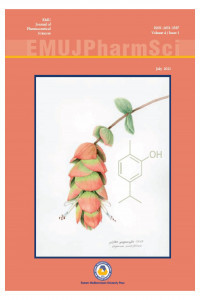Richness of Wild Flowering Plants and Ferns in Northern Cyprus
Richness of Wild Flowering Plants and Ferns in Northern Cyprus
Endemic taxa, Northern Cyprus, wild vascular plants,
___
- Anonim (2003). Kanlidere ve Asidere Florasi. Kibris Turk Biyologlar Dogayi Arastirma ve Koruma Dernegi. Lefkosa, Kibris.
- Brandes D (2020). Some contributions to the wall flora of North Cyprus. Braunschweiger Geobotanische Arbeiten 14: 11-33.
- Hadjichambis A Ch, Della A, Paraskova-Hadjichambi D, Georghiou K, Dimopoulos P (2004). Flora of the Sand Dune Ecosystems of Cyprus. Proceeding 10th MEDECOS conference, Rhodes, Greece.
- Hadjikyriakou G, Hadjisterkotis E (2002). The Adventive Plants of Cyprus with New Records of invasive species. Hadjikyriakou G, Hand R (2008a). Ministry of Agriculture and Ministry of the Interior, 45: 59-71 Nicosia, Cyprus. Notes on Teucrium sect. Polium (Lamiaceae) in Cyprus. Willdenowia 38.
- Hadjikyriakou G, Hand R (2008b). Notes on Teucrium sect. Polium (Lamiaceae) in Cyprus. Willdenowia 38.
- Hand R, Hadjikyriakou GN, Christodoulou CS (2011) (continuously updated): Flora of Cyprus – a dynamic checklist. Published at http://www.flora-of-cyprus.eu/ Accessed 02.12.2021
- Hand R, Chrysostomou CS, McLoughlin EM (2021). Rostraria hadjikyriakou (Poaceae) a new gypsophilos and endemic species from Cyprus. Fl Medit 31: 71-82.
- Hand R (2018). Additional data on Beta in Cyprus. Cypricola 5: 1-3.
- Hand R (2019). Further noteworthy records of vascular plants in Cyprus (1997-2018) and some status clarification. Cypricola 12: 1-17.
- Hand R (2001) (edited). Supplementary notes to the flora of Cyprus II. Willdenowia 31: 183-409.
- Ilseven S (2004). Kuzey Kıbrıs’ın doğal orman ve park ağaçları. G. Magusa, Kozansoy Basim Yayim Ltd.
- Ilseven S, Hidirer G, Tumer A (2006). Kıbrıs Coğrafyası. FSF Matbaacılık.
- Meikle R (1977). Flora of Cyprus, vol. I, Bentham-Moxon Trust, Royal Botanic Gardens. Kew.
- Meikle R (1985). Flora of Cyprus, vol. II, Bentham-Moxon Trust, Royal Botanic Gardens Kew.
- Sekerciler F, Merakli MK (2013). A new record for the Flora of Northern Cyprus: Solanum angustifolium Mill. (Solanaceae). Biodivers Conserv 6 (1): 178-181.
- Tamson S (2014). Orchids of Northern Cyprus. Ankara, Published by Ertem Basım.
- Pariona A (2018). The most populated islands in the Mediterranean Sea. WorldAtlas. Published at https://www.worldatlas.com/articles/biggest-islands-in-the-mediterranean-sea.html. Archived from the original on 12 May 2018. Accessed 02.12.2021.
- Viney DE (1992). Endemic Wild Plants of North Cyprus, TBMM Basımevi.
- Viney DE (1994, 1996). An Illustrated Flora of North Cyprus. Vol. I-II, Published by Paperback (2011). KoeltzScientific Books, Koenigstein, Germany.
- Viney DE (2011). An Illustrated Flora of North Cyprus. Paperback Published by R.G. Gantner Verlag, Ruggell, Liechtenstein.
- Vural M, Zeydanli U, Beton D, Merakli MK (2010). Determining Core Areas of Floral Species Richness in the Karpaz Peninsula (Cyprus). Top Biodiversity Cyprus 2010 Conference Proceedings.
- Yildiz K, Guzel S (2008). Morphological Investigation of Some North Cyprus Endemics. Int J Eng Sci 2 (3): 85-91
- ISSN: 2651-3587
- Başlangıç: 2018
- Yayıncı: Doğu Akdeniz Üniversitesi
Richness of Wild Flowering Plants and Ferns in Northern Cyprus
F. Neriman ÖZHATAY, Ertuğrul ÖZBİL, Sultan ÖĞMEN SEVEN
Moein AMEL, Leyla BEBA POJARANİ, E. Vildan BURGAZ, Ömer TÜRKMEN
Influence of carnauba wax on the release profile of ibuprofen implants
Collins AİREMWEN, Jude ISESELE, Johnbull OBARİSİAGBON, Emmanuel HALILU, Michael UHUMWANGHO
Pollen morphology of some taxa in the family Lamiaceae (Labiatae) from Turkey
Tea Tree (Melaleuca alternifolia (Maiden & Betche) Cheel) Oil an important medicinal essential oil
